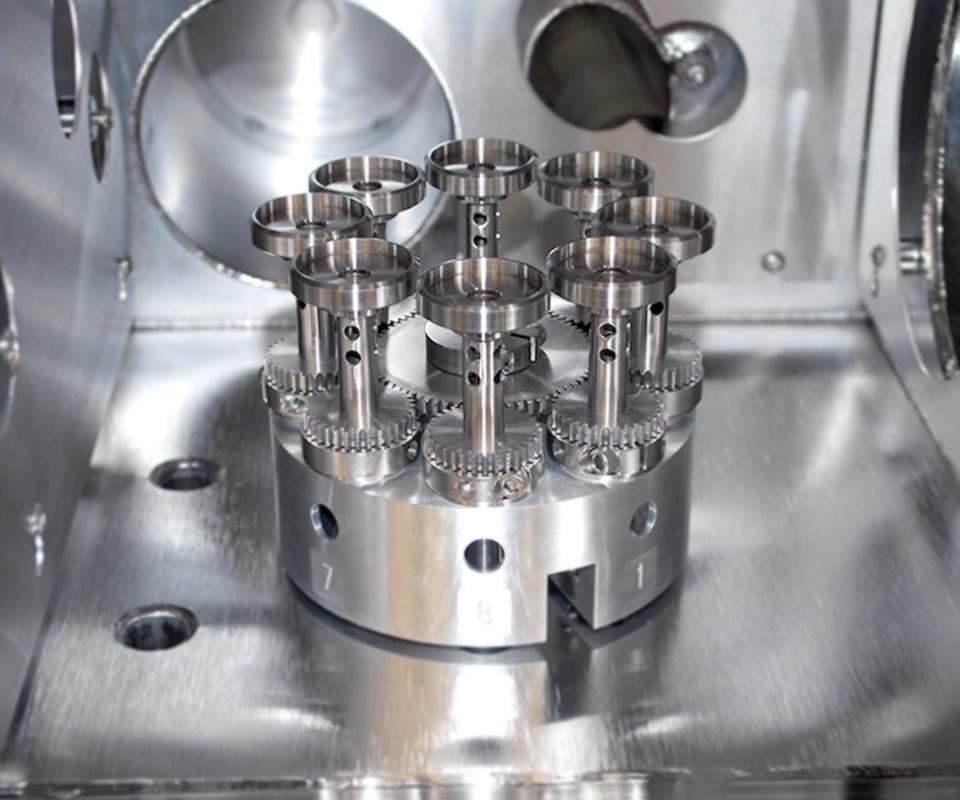
All of our target manipulators include motorized target indexing and target rotation. Target toggling can also be provided in some systems if laser beam rastering is not included. All systems can easily accommodate smaller diameter targets than the maximum size specified.
Our target manipulators utilize a ferrofluidic dual-axis rotary feedthrough. These types of manipulators require a single feedthrough and one port, are very robust, and will provide years of trouble-free operation when compared to bellows-style feedthroughs.
In order to achieve uniform film properties in most systems, the laser beam is rastered across the large diameter targets using a programmable mirror incorporated into the optical train. The focused beam is rastered across the whole target to minimize cone formation and reduce the number of particles in the deposited films.
As noted in the table, all of our PLD systems use large diameter targets. Thus, the laser beam path length varies as it is scrolled from one edge of the target to the other, and the laser fluence will change. In our PLD 2000 and 3000 and PLD/MBE systems, the variation in fluence on the target surface is less than that of the pulse-to-pulse stability of the excimer laser. Our systems with larger substrates and targets include a special constant-fluence optical train. Here the focus lens is mounted on a programmable stage whose position is slaved to that of the raster mirror. As the raster mirror scrolls the laser beam from one end of the target to the other, the focus lens is moved in such a way that the beam path and the focused spot size remain constant.
Changing targets is a very simple one-minute process because of the chamber designs: simply vent the chamber, open the hinged door or raise the top lid, and remove the target shield cover. Then, remove the target and replace it with a new one.
If more than one target needs to be exchanged, one simply needs to index the target manipulator so that the next target to be exchanged is exposed. When all the targets are exchanged, the cover shield is replaced. No flanges, gaskets, or water lines need to be removed from any PVD system for this process.
PVD Products recommends the use of large diameter targets, as they are necessary for producing large-area and reproducible films. Laser beam rastering over large diameter rotating targets yields excellent film uniformity and does not require constant “resurfacing” the way small diameter targets do on a routine basis.
PVD Products can also provide a wide range of PLD targets.
| System | Box or Cylinder | Max Substrate Size | Standard # Of Targets | Max Target Diameter |
| Nano PLD | Box | 2” (50.4-mm) | 8 | 1″ |
| Nano PLD | Box | 2” (50.4-mm) | 4 | 2″ |
| PLD 2000 | Box | 2” (50.4-mm) | 4 | 3″ |
| PLD 3000 | Box | 3” (75-mm) | 3 | 4″ |
| PLD 4000 | Box | 4” (100-mm) | 4 | 4″ |
| PLD 5000 | Box | 5” (125-mm) | 3 | 6″ |
| PLD 6000 | Box | 6” (150-mm) | 3 | 6″ |
| PLD 8000 | Box | 8” (200-mm) | 3 | 8″ |
| PLD 12000 | Box | 12” (300-mm) | 4 | 4″ |
| PLD/MBE 2100 | Cylinder | 2” (50.4-mm) | 6 | 2″ |
| PLD/MBE 2300 | Cylinder | 2” (50.4-mm) | 6 | 2″ |
| PLD/MBE 2500 | Cylinder | 2” (50.4-mm) | 6 | 2″ |
| PLD/MBE 2100L | Cylinder | 2” (50.4-mm) | 6 | 2″ |
| PLD/MBE 2300L | Cylinder | 2” (50.4-mm) | 6 | 2″ |
| PLD/MBE 2500L | Cylinder | 2” (50.4-mm) | 6 | 2″ |